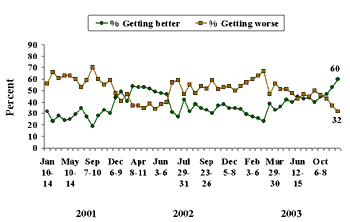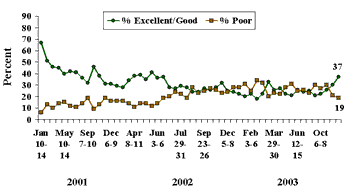Even before Saddam Hussein was caught, consumers had numerous reasons to be optimistic, as the economic data continue to show the recovery is well underway. As the Dow passed the 10,000 mark, however, it was reported that the preliminary findings of the University of Michigan Consumer Sentiment Survey showed consumer sentiment declining in the first half of December. In turn, new concerns arose about consumer spending during the holidays.
In sharp contrast, a new Gallup Poll completed last weekend (Dec. 11-14) shows consumer optimism continuing to increase as of mid-December:
- Consumer ratings of the current economy are at their highest level since June 2002;
- Consumer expectations for the future of the economy are the most optimistic they have been in over three years; and
- The percentage of consumers saying the economy is the nation's most important problem is down by one-third over the past two months.
Importantly, Gallup's data reflected all of these findings even before Hussein was taken into custody. After he was apprehended, there was a modest additional increase in consumer assessments of the current economy, but essentially no impact on consumer expectations for the future.
Optimism About the Economic Direction Continues to Increase
In mid-December, 60% of consumers say economic conditions are "getting better" -- up from 53% in November. At the same time, the percentage saying conditions are "getting worse" fell from 37% to 32%. As noted, consumer economic expectations did not change immediately following Hussein's capture. Still, the December increase in consumer optimism about the direction of the U.S. economy suggests not only a significant improvement compared to a month ago, but also that current consumer expectations are the most optimistic they have been since August 2000.
| Economic Conditions Getting Better or Getting Worse? |
 |
Economic Assessments Also Improve
More consumers say current economic conditions are "good" or "excellent" (37%) than say they are "poor" (19%) -- a difference of +18 percentage points. This is twice the positive difference of early November. These ratings did improve modestly following the capture of Hussein, but even before that event took place, they had increased somewhat.
Regardless, consumers now rate the economy much better than they did a year ago -- when the difference between the good/excellent and poor ratings was –4 percentage points -- and about the same as in December 2001, when the difference was +15 percentage points. Still, today's ratings are nowhere near the level of December 2000, when the difference stood at +55 percentage points.
| Rating of Current Economic Conditions |
 |
Most Important Problem
In early October, 25% of the public pointed to the economy in general as the most important problem facing the country and another 15% pointed directly to unemployment and jobs. By mid-December, the percentage of consumers pointing to the economy in general had declined to 17% and those indicating unemployment and jobs had fallen to 10%. This reduction of one-third in the percentage of people seeing the economy and unemployment as the major problems facing the country provides additional confirmation for the other trend questions that suggest a continuing increase in consumer optimism in mid-December.
Questioning Michigan's Preliminary Report
The University of Michigan's preliminary measure of consumer sentiment is not officially released but instead is attributed to "market sources" who have seen the preliminary report. It is based on a relatively small number of consumer interviews (about 250). This is particularly important during December, when interviewing can show a lot of small-sample volatility given the holiday season. Add in Gallup's much more robust sample size (1,011 interviews) and our finding that consumer optimism has continued to increase in December, and there is good reason to question the University of Michigan's preliminary consumer-sentiment estimates.
Good Holiday Spending
Gallup's new poll shows consumer expectations to be higher than they have been at any time during the past three years. This is a great way to end a difficult year for the U.S. economy. It means good things for small businesses that have been struggling with an inability to increase their top-line revenues. It gives all businesses the hope that they'll see an increase in their pricing power next year. And, it gives the rest of us a realistic expectation that the current recovery will continue to build momentum in 2004.
Survey Methods
Results are based on telephone interviews with 1,011 national adults, aged 18 and older, conducted Dec. 11-14, 2003. For results based on these total samples, one can say with 95% confidence that the margin of sampling error is ±3 percentage points. In addition to sampling error, question wording and practical difficulties in conducting surveys can introduce error or bias into the findings of public opinion polls.

